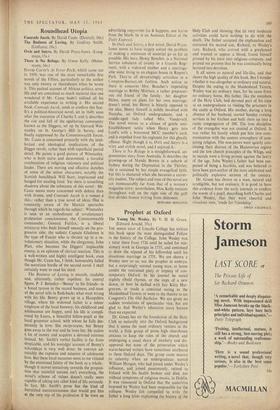Prophet at Oxford
The Young Mr. Wesley. By V. H. H. Green. (Edward Arnold, 35s.)
THE senior tutor of Lincoln College has written this book upon the most distinguished Fellow in the history of the College. John Wesley was a tutor there from 1726 until he sailed for mis- sionary work in Georgia in 1735, and continued to draw the stipend of his fellowship until his disastrous marriage in 1751. We are shown a Wesley new to us, not the prophet in embryo, but a surprisingly normal young man, at home amidst the restrained piety or impiety of con- temporary Oxford. In his journal he noted slightly ribald rhymes, or the steps of a new 6nce, or how he dallied with fair Kitty Har- greaves, or made a convivial outing to the Maidenhead Tavern, or went to the theatre to see Congreve's The Old Bachelor. We are given no sudden revelations of spectacular vice, but are glad to find Wesley's education more human than we expected.
Dr. Green has set the foundation of the Holy Club so naturally into the Oxford background that it seems the most ordinary venture in the world, a little group of piotis high churchmen anxious to keep the rules of the church and undergoing a usual share of mockery and dis- approval but none of the persecution which warm-hearted writers have sometimes attributed to these Oxford days. The group came nearest to calamity when an undergraduate named William Morgan, who had joined under Wesley's influence, and joined passionately, retired to Ireland with his health broken and died, not without symptoms of religious mania, in Dublin. It was rumoured in Oxford that the austerities imposed by Wesley had been responsible for the collapse. Wesley felt compelled to write the father a long letter explaining the history of the Holy Club and showing that its very moderate activities could have nothing to do with the death. The father accepted the explanation and entrusted his second son, Richard, to Wesley's care. Richard, who arrived with a greyhound and wanted to appear a blood, found himself pressed by his tutor into religious company, and poured out protests that he was continually being lectured into devotion.
It all seems so natural and life-like, and that shows the high quality of this book. But I wonder whether it was altogether so ordinary and natural. Despite the outing to the Maidenhead Tavern, Wesley was no ordinary man, for he came from no ordinary home. His father, like the members of the Holy Club, had devoted part of his time as an undergraduate to visiting the prisoners in the castle at Oxford. His mother, during a long absence of her husband, started Sunday evening services in her kitchen and built them up into a rustic congregation of 200. The iron discipline of the evangelist was not created at Oxford. It was rather his family which put him into com- munication with the austere atmosphere of non- juring religion. The non-jurors were quietly con- tinuing their distrust of the Hanoverian regime and the low church principles of the Whigs, and in morals were a living protest against the laxi'y of the age. John Wesley's father had been sus- pected of being a Jacobite, and was believed to have been part-author of the most celebrated and politically explosive sermon of the century.
Dr. Green has shown us a man, natural and intelligible, but not ordinary. It is good to have this evidence from the early journals to confirm the words of a pupil, describing both Charles and John Wesley, that they were cheerful and vivacious men, 'made for friendship.'
OWEN CHADWICK






































 Previous page
Previous page